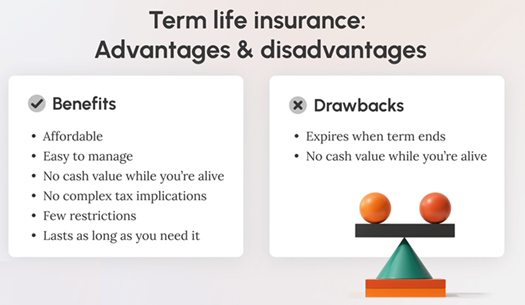Section 11-3: Term Life Insurance
Section 11-3: Term Life Insurance
Overview

 Term life insurance is a type of life insurance that provides coverage for a specific period, known as the 'term.' If the insured individual dies during the term of the policy, the beneficiaries receive a death benefit payout. Term life insurance is designed to provide financial protection for a temporary period, such as 10, 20, or 30 years.
Term life insurance is a type of life insurance that provides coverage for a specific period, known as the 'term.' If the insured individual dies during the term of the policy, the beneficiaries receive a death benefit payout. Term life insurance is designed to provide financial protection for a temporary period, such as 10, 20, or 30 years.
Here are some key features of term life insurance:
Fixed Premiums: Term life insurance typically has fixed premiums for the duration of the term. This means that the premium remains the same throughout the term, providing predictability for budgeting purposes.
Death Benefit: The death benefit is the amount of money paid to the beneficiaries upon the death of the insured individual during the term of the policy. Beneficiaries can use the death benefit to cover expenses such as mortgage payments, living expenses, debts, and other financial obligations.
Term Length: Term life insurance policies have a specified term length, which can range from 5 to 30 years or more, depending on the insurance company and policy options. You can choose a term length based on your financial needs and obligations, such as the duration of your mortgage or until your children are financially independent.
Convertible Options: Some term life insurance policies offer the option to convert to a permanent life insurance policy, such as whole life or universal life insurance, without the need for a medical exam. This can provide flexibility if your needs change over time and you want to extend your coverage beyond the initial term.
Affordability: Term life insurance is often more affordable compared to permanent life insurance policies such as whole life or universal life insurance. This makes it an attractive option for individuals who want basic life insurance coverage without the higher premiums associated with permanent policies.
No Cash Value: Unlike permanent life insurance policies, term life insurance does not accumulate cash value over time. Once the term ends, the policy expires, and there is no return on investment or cash value to the policyholder.
Term life insurance is suitable for individuals who have temporary financial obligations or dependents who rely on their income for a specific period. It can provide peace of mind knowing that loved ones will be financially protected in the event of your death during the term of the policy. It's essential to carefully consider your financial needs and goals when choosing a term length and coverage amount for your life insurance policy.
Online Textbook Read Section 11-3: (Term Life Insurance)
